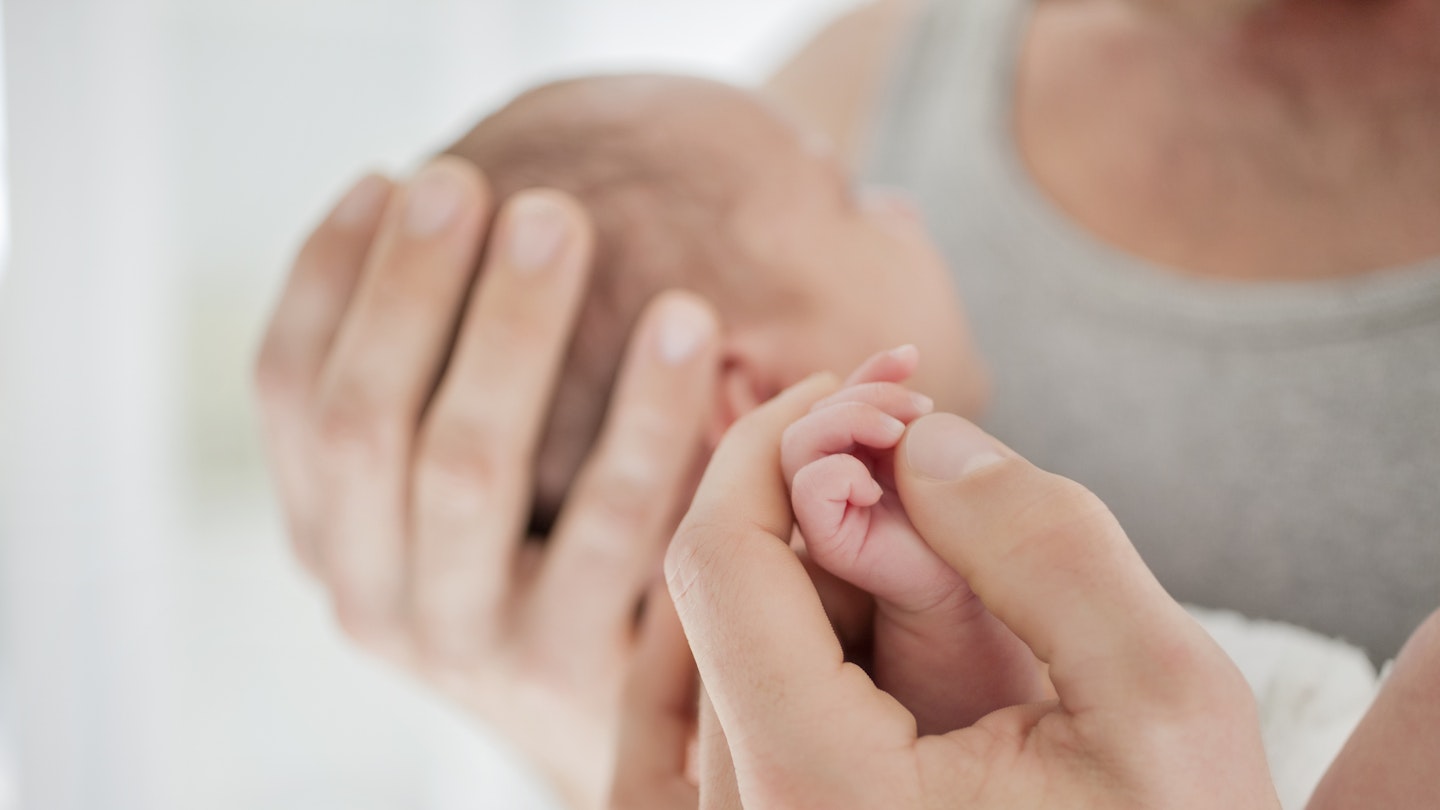
Medically Reviewed by: Nurse and Midwife Zoe Watson
Even though you're still very much in the newborn baby bubble, you officially have a 5-week-old baby! You're already in the second month of your baby’s new life, and will probably feel like the time is flying by as they reach all their important baby development milestones. As the days continue, we’re sure you have a few questions about your little one’s week-by-week development.
The past five weeks have probably been a huge whirlwind of feeding, burping, nappy changes and disturbed sleep, but there's been some lovely moments, too. You're still finding your feet in your role as a new mum, but you're starting to pick up on your baby's cues and cries and respond to them as best you can. If you haven’t already, this week you're more than likely to see your baby’s first smiles. Trust us, it will make five weeks of sleep deprivation seem like a distant memory, though they often still might be a bit of wind!
We have enlisted the help of registered MAM Midwife Zoe Watson to help explain everything you need to expect when your baby is five weeks old, from baby sleep to development milestones.
Development milestones for 5-week-old baby
Growth
At this stage, your baby is likely to be profiting from all the amazing milk they're getting, and they have their first real baby growth spurt between 4 and 6 weeks. Usually gaining around 140-200 grams per week, this week your baby will likely be closer to the 200-gram mark. Even though it has only been five weeks since you welcomed your baby into the world, they are steadily progressing to a smiling and noisy baby. You'll definitely be noticing changes, as will friends and family too.
Reflexes
Those newborn reflexes, such as baby's moro reflex, that you'll have noticed after birth will start to disappear this week as your baby gains more control over their movements. Because of this, you might notice them reaching out for toys on their baby gym and their little legs kicking more often.
Zoe says, "At five weeks old, it’s normal for a baby to become a little more alert and responsive to the world around them. Physically, movements are still quite jerky and reflex-driven, but during tummy time, it’s normal for babies to begin lifting their head briefly. The startle reflex is still present too, so sudden arm flails are completely expected. Every baby develops at their own pace, so there’s no need to worry if all of these milestones haven’t happened yet. If there are any concerns, a health visitor or GP is always available for one-to-one support."
Vision
With their hearing fully developed and their eyes close behind, it’s a great time to get out the colourful, musical baby toys and test those new senses. Black and white sensory toys are a great choice for newborn babies as their vision is still developing and they can easily distinguish high contrast patterns like black and white and focus on them much more easily than bright colours. Colours can be a little overwhelming for them at this age so it is worth waiting until they are a little older to introduce the bold and colourful sensory toys.

Strength
Your baby's neck is also getting stronger which means they’re finally holding their head up. Granted it’s most likely only for a few moments while they lay on their stomach or sit in their car seat, but when baby is holding their head up, it’s still a milestone to be proud of.
Your little one's clutching skills have now advanced so that they can hold little items that you place in their hands. You'll probably find their little grip getting tighter around your fingers too this week.
How much should a 5-week-old baby be sleeping?
As your baby is much more alert, they’re now likely to be awake for around ten hours a day, as opposed to six in previous weeks. Your five-week-old may be sleeping about eight or nine hours overnight, but it is unlikely that they will be sleeping longer than five hours at a time and they will wake up for feeds and comfort. Zoe explains that it's completely normal for a new baby to spend more time asleep than awake. "On average, babies at this age sleep around 18 hours over a 24-hour period, once you add up their daytime naps and nighttime sleep. It’s also very normal for them to wake frequently during the night, often because they need to feed, but also for comfort and closeness. This is biologically normal and expected behaviour. Young babies have tiny tummies, so they need to feed regularly in order to grow and thrive. Their sleep patterns are guided more by instinct than habit, and while frequent night waking can feel exhausting at times, it is a phase that will eventually pass."
At five week you can help them begin to establish the difference between night and day by following simple steps like keeping the house bright and noise levels normal in the daytime. Of course, every baby is different and what works for one might not work for your baby, so give it time to find the right routine for you. A five-week-old baby generally sleeps between 15.5 and 18 hours a day, including naps. They are unlikely to sleep through the night in long stretches and will wake up 2-3 times in the night to be fed. At this age, your baby will have their own pattern of waking and sleeping, but some babies may be starting to sleep for longer at night, depending on if they have a full belly. Feeling sleep deprived? Ask for help. If you're breastfeeding and have established a into a good breastfeeding routine, your partner could occasionally give a bottle of expressed breast milk during the night. If you're on your own, you could ask a friend or relative to stay for a few days so you can get some sleep.
Repeating the same routine every evening before bed will provide a sense of security and safety for your newborn. It also helps establish healthy habits and support development. Here are some tips to help establish a nighttime routine with your little one:
Having a bath at a similar time each night
Quiet time before bed
Reading a story. Even though your little one won't understand what you're talking about, they will recognise your voice and it will help soothe them. Plus, reading a story is a great way to establish a closer bond and they will thank you in the long run.
Singing a lullaby or having the same music or playlist you turn to when you've put your baby to bed or when you're changing them into their night clothes.
At five weeks, your baby may be experiencing growth spurts that can lead to increased hunger and fussiness, as well as changes in sleep patterns.
Sensory & cognitive development for 5-week-old

More alert
You’ll start to notice your baby is much more alert. They’re now likely to be awake for around ten hours a day, as opposed to six in previous weeks. This means more of their personality will start to show and you can enjoy longer wake windows.
Following your movement
A five-week-old should be able to vaguely track your movement from side to side. Their eyes are developing at an incredible rate meaning they can focus more easily and eyesight will improve even more in week six of their development.
Introducing play
Now your baby is awake for longer, you can introduce play into their routine a bit more. Perhaps five-ten minute sessions a couple of times a day (keep it short because you don't want to overstimulate them). Examples could be singing them a song, chatting about objects or landscapes you can see or even showing them a specific toy or cloth book.
Tummy time
Five weeks is a great time to introduce tummy time. Help strengthen their neck and muscles by starting with very short sessions (two to five minutes) two or three times a day. Focus on short bursts of time and try again later if your little one starts getting fussy or upset. Every little helps!
Feeding and nutrition for 5-week-old baby
Since this week is one for growth spurts and improved cognitive development, it’s normal to find they're hungrier than they were in the fourth week of baby's life. Keep in line with general advice to feed about 150ml-200ml per kilo of their weight, but make sure to follow your baby's lead - they’ll still know just how much food is right for them at this stage.
If you’re breastfeeding your baby, it may also be a good time to think about expressing your breast milk. It’s best to wait until your baby is used to breastfeeding before you introduce a new variation, but after five weeks you’ll hopefully be getting the hang of things. If you’re still struggling, seek some medical advice and chat to your health visitor.
5 week old baby - nappies
"At five weeks old, it’s completely normal for babies to have a wide range of bowel movement patterns," explains Zoe. "How you feed your baby can also impact their poo. Breastfed babies often have runny, yellow poo that doesn’t have a strong smell, and they may poo several times a day, sometimes after every feed. For breastfed babies, the poo should be at least the size of a £2 coin, and they should be pooing at least twice a day for the first six weeks.
"As babies grow, especially after six weeks, the frequency of their poos may slow down or the pattern may change. Formula-fed babies, on the other hand, tend to have firmer, darker, and smellier poo. They might poo up to five times a day in the early weeks, but this can decrease to once a day after a few months. As long as the poo is soft and the baby seems comfortable, there’s usually no need for concern. However, if you notice that your baby hasn’t done a poo, has fewer wet nappies, or if there are any big changes such as very pale or hard stools, blood in the nappy, or a baby struggling to go, it’s always best to speak to a healthcare professional for peace of mind."
It might sound obvious, but with the increase in food comes the increase in poo! If you're more concerned about what they are pooing than how much, you might want to check out a poo colour chart to put your mind at ease.
However, if you're concerned about frequency, your baby may be constipated and need some help. Look out for a loss of appetite, crying and discomfort before doing a poo, less than three bowel movements a week or a dry hard poo. If you notice these things, contact your GP.
Your 5-week-old baby's health and safety
Jabs
You still have three weeks to prepare for this one as babies don’t need any jabs till they're two months old. In the meantime, you might want to find out how to keep your baby calm during routine vaccinations.
Colic
Baby colic is defined as uncontrollable crying for hours on end, three times a week for at least three weeks. If you’re struggling with colic, know that you’re not alone and it’s nothing that you’re doing – in fact, this is a condition that affects up to 40 per cent of babies. It's advised to take a trip to your doctor's to try and find the best way of helping your baby through colic.
Different cries
By week five, you'll probably be getting to know your baby's different cries and what they mean so you'll have an easier time working out why your baby is crying. For example, they'll have a certain cry for hunger, one for tiredness and one for changing. You may also notice your baby is getting better at communicating with you in this way too.
Baby acne
Baby acne is actually one of the most common skin conditions that develop amongst infants. Baby acne consists of red and yellow small bumps that typically appear after the first month or so after birth. It is a harmless condition and in almost all cases, the acne completely clears by the time the newborn reaches six months. The best solution is to simply wash your baby’s face with plain water once or twice a day and gently pat it dry.
Practical parenting tips - looking after yourself
For the past five weeks, you've been looking after every need of a (probably quite demanding) new life. You may have found a bit of your groove, but you may just be taking it each day (or hour) as it comes. That's okay! But you also need to look after yourself. If your baby is exclusively breastfed, it might be tricky to get some time for self-care, but just an hour off can make a huge difference to your wellbeing, as can trying to spend quality time with your partner, friends and family. Having a shower each day will do wonders for your mental health (and your milk production), and trying to get outdoors for some fresh air will do too. Always remember that you still have a newborn and your health visiting team will be there for you. Don't be afraid to ask for help or support.
Zoe says, "The adrenaline of the early newborn days may be wearing off, and the reality of broken sleep, round-the-clock feeds, and the physical and emotional recovery from birth can really set in. Sleep deprivation is completely normal but can feel overwhelming. Try to rest when you can and accept help where possible. It’s also a good time to check in with your emotional wellbeing."
Sleep deprivation
Interrupted sleep getting you down? It might be worth switching up your diet with some energy-boosting foods.
Postnatal Depression
You may be starting to feel more settled in your hormones, however, if you're overwhelmed by the feeling that everything could go wrong and it’s all your fault, you may be experiencing symptoms of postnatal depression. It happens to one in ten women and is nothing to be ashamed of. Don't be afraid to reach out and speak to your doctor if you’re worried.
On looking after you, Zoe adds, "Postnatal depression can begin at any time during the first year and might show up as persistent low mood, irritability, or feeling disconnected from your baby. You're not alone, and support is available. Your GP, health visitor, or organisations like the Maternal Mental Health Alliance or Pandas Foundation can all help. Most importantly, don’t forget that looking after yourself is part of looking after your baby. Eat when you can, drink plenty of water, and find small moments just for you, whether it’s a cup of tea in silence or a ten-minute walk in the fresh air."
Conclusion
As you edge closer to the 8-week mark, which officially means you no longer have a newborn, you should still be soaking up every inch of the baby bubble. Your little one is totally reliant on you still and won't really have a "schedule", but they will be spending a lot more time awake, so enjoy those smiles, even if they are sometimes wind. Sleep times and durations will vary and this is normal so if you have a partner, it might be worth trying to figure out shifts where you can have a little bit of a break, as one of you will most likely be back at work at this point. Your baby is growing rapidly, so it may be worth sorting out their newborn clothes, which they may be struggling to fit into. Their head control is improving, so keep doing tummy time to strengthen their neck muscles. But remember, all babies are different, so don't worry if your baby isn't hitting the same milestones as their friends. As long as you're both happy and healthy, they'll develop at their own pace.
5-week-old baby FAQs
What should a five week old baby be doing?
Even though they are still a newborn, your little one will be getting much more alert and aware of the world around them. They may also start smiling, a real milestone moment!
What is a five week old baby's routine?
Your baby will be spending a lot of their day sleeping and eating, but they are starting to have longer wake windows. As they're starting to be more aware of the world around them it's a great time to build in activities like tummy time and singing while they are awake.
Is it okay for a 5 week old to sleep through the night?
Most 5-week-old babies will still wake during the night to feed, but if your baby is sleeping through the night they will be fine. Once they reach birth weight and are growing nicely, there is no need to wake them for a feed during the night.
How long can a 5 week old go between feedings?
Every baby is different, but between 2 to 4 hours.
About the expert
Zoe Watson is a Registered Nurse and Midwife with over fifteen years of experience in caring for patients and their families. She has worked in various settings, from a specialist home birth team to a high-risk delivery suite. Zoe is passionate about maintaining her professional development to enhance the advice and support she gives to new and expectant parents.
About the author
Hannah Mellin is Digital Writer at Mother & Baby. She has over a decade of experience writing for Bauer media titles. Hannah is a mama to a little boy and is navigating her way through first-time parenthood. She is passionate about nature, body positivity and children's mental health.
